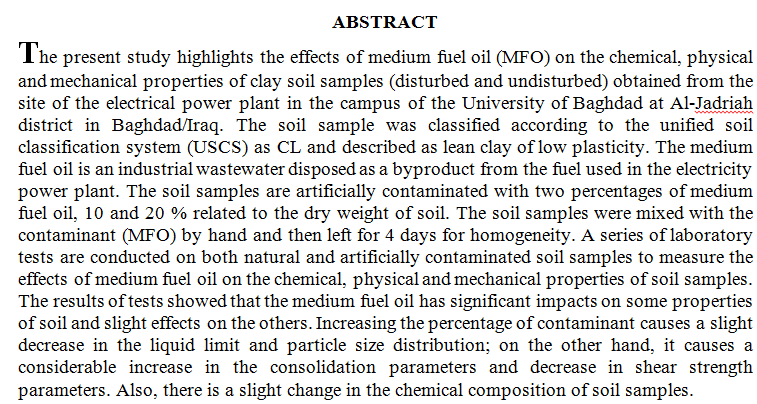
The specifications of lubricating oil are fundamentally the final product of materials that have been added for producing the desired properties. In this research, spherical nanoparticles copper oxide (CuO) and titanium oxides (TiO2) are added to SAE 15W40 engine oil to study the thermal conductivity, stability, viscosity of nano-lubricants, which are prepared at different concentrations of 0.1%, 0.2%, 0.5%, and 1% by weight, and also their pour point, and flash point as five quality parameters. The obtained results show that CuO nanoparticles in all cases, give the best functionality and effect on engine oil with respect to TiO2. With 0.1 wt. % concentration, the thermal conductivity of CuO/oil and TiO2/
... Show More (27)
(27)
This thesis aims to study the effect of addition polymer materials on mechanical properties of self-compacting concrete, and also to assess the influence of petroleum products (kerosene and gas oil) on mechanical properties of polymer modified self-compacting concrete (PMSCC) after different exposure periods of (30 ,60 ,90 ,and 180 days).
Two type of curing are used; 28 days in water for SCC and 2 days in water followed 26 days in air for PMSCC.
The test results show that the PMSCC (15% P/C ratio) which is exposed to oil products recorded a lower deterioration in compressive strength's values than reference concrete. The percentages of reduction in compressive strength values of PMSCC (15% P/C ratio) was
... Show MoreExpansive soils are recognized by their swelling potential upon wetting due to the existence of some clay minerals such as montmorillonite. An effective solution was found to avoid the danger of such soils by using piles. A single pile embedded in an elasto-plastic expansive soil has been analyzed by using one of the available software which is ABAQUS to investigate the effect of applied loads on pile’s top and investigate the effect of swelling soils on load carrying capacity of the pile. The result shows that as the pile is axially loaded at its top, the axial force along the pile gradually changes from (tension) to (compression) and the pile tends to move downward. The applied load needed to initiate pile’s settlement depend
... Show MoreAbstract
This paper represents a study of the effect of the soil type, the drilling parameters and the drilling tool properties on the dynamic vibrational behavior of the drilling rig and its assessment in the drilling system. So first, an experimental drilling rig was designed and constructed to embrace the numerical work.
The experimental work included implementation of the drill-string in different types of soil with different properties according to the difference in the grains size, at different rotational speeds (RPM), and different weights on bit (WOB) (Thrust force), in a way that allows establishing the charts that correlate the vibration acceleration, the rate of penetration (ROP), and the power
... Show MoreKnowing the distribution of the mechanical rock properties and the far field stresses for the field of interest is an important task for many applications concerning reservoir geomechanics, including wellbore instability analysis, hydraulic fracturing, sand production, reservoir compaction, and subsidence. A major challenge with determining the rock's mechanical properties is that they cannot be directly measured at the borehole. Furthermore, the recovered carbonate core samples for performing measurements are limited and they provide discrete data for specific depths.
The purpose of this study is to build 2D and 3D geomechanical models of the Khasib reservoir in the East Baghdad oil field/ Central area. TECHLOG.2015.3 softwa
... Show More (1)
(1)
In this study, a novel application of lab-scale dual chambered air-cathode microbial fuel cell (MFC) has been developed for simultaneous bio-treatment of real pharmaceutical wastewater and renewable electricity generation. The microbial fuel cell (MFC) was provided with zeolite-packed anodic compartment and a cation exchange membrane (CEM) to separate the anode and cathode. The performance of the proposed MFC was evaluated in terms of COD removal and power generation based on the activity of the bacterial consortium in the biofilm mobilized on zeolite bearer. The MFC was fueled with real pharmaceutical wastewater having an initial COD concentration equal to 800 mg/L and inoculated with anaerobic aged sludge. Results demo
... Show MoreCrystalline silicon (c-Si) has low optical absorption due to its high surface reflection of incident light. Nanotexturing of c-Si which produces black silicon (b-Si) offers a promising solution. In this work, effect of H2O2 concentrations towards surface morphological and optical properties of b-Si fabricated by two-step silver-assisted wet chemical etching (Ag-based two-step MACE) for potential photovoltaic (PV) applications is presented. The method involves a 30 s deposition of silver nanoparticles (Ag NPs) in an aqueous solution of AgNO3:HF (5:6) and an optimized etching in HF:H2O2:DI H2O solution under 0.62 M, 1.85 M, 2.47 M, and 3.7 M concentrations of H2O<
... Show More (4)
(4)
 (6)
(6)
 (6)
(6)
 (4)
(4)
